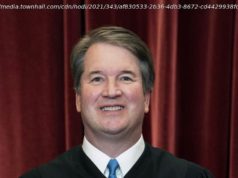A child rapist’s conviction for failing to register as a sex offender should be set aside because federal rules requiring him to register were created improperly, the offender’s lawyer told skeptical members of the Supreme Court on Oct. 2. This is the second case of the court’s new term in which the issue is whether…
A child rapist’s conviction for failing to register as a sex offender should be set aside because federal rules requiring him to register were created improperly, the offender’s lawyer told skeptical members of the Supreme Court on Oct. 2.
This is the second case of the court’s new term in which the issue is whether Congress delegated too much power to the executive branch, in violation of the Constitution. On Oct. 1, the court heard oral arguments in a case concerning regulations seeking to protect an endangered frog.
At issue is the non-delegation doctrine, a constitutional and administrative law principle that has rarely been invoked lately, and flows out of Article I of the U. S. Constitution. Because “All legislative Powers herein granted shall be vested in a Congress of the United States,” the doctrine holds that Congress isn’t allowed to delegate its lawmaking powers to executive agencies or private entities.
While the high court relied on the doctrine in striking down elements of the New Deal in Schechter Poultry Corp. v. U. S. (1935), the otherwise straightforward legal principle was undermined in the Progressive Era. In 1928, in J. W. Hampton Jr. & Co. v. U. S. the court read language into Article I that doesn’t exist: Lawmaking powers may be delegated so long as Congress lays down an “intelligible principle” on which the recipient of the delegated powers may act.
Although the court acknowledged in Mistretta v. U. S. (1989) that Congress generally isn’t allowed to delegate its legislative powers to another branch of government, it favorably cited its 1928 decision, which held Congress may seek assistance from the other branches.
While a decision to strike down the federal sex-offender registration regulations in question would be truly revolutionary in its ramifications, and call into question the legitimacy of the modern administrative state — replete as it is with unelected bureaucrats exercising vast powers the framers of the U. S. Constitution never intended them to possess—the justices seemed largely unmoved by the arguments presented.
At oral arguments on Oct. 2, no one disputed that Herman Avery Gundy, 44, who convicted in 2005 of raping an 11-year-old girl, failed in 2012 to register as a sex offender as required by the now 12-year-old Sex Offender Registration and Notification Act (SORNA). However, litigants clashed over the constitutionality of SORNA. Gundy now lives and works in Hagerstown, Maryland, where he is currently registered as a sex offender.
Enacted in 2006, SORNA aimed to close gaps and loopholes under prior laws, as well as to strengthen the nationwide network of sex offender registrations. Registration makes information such as the offender’s name, current location, and past offenses available to local and federal authorities and the public after a sex offender is released into the community. All 50 states, the District of Columbia, and some territories operate sex-offender websites and must comply with SORNA.
In 2008, the U. S. Department of Justice approved guidelines that applied SORNA’s registration requirement to sex offenders from the pre-SORNA era, including Gundy. Gundy objects to this application of the regulations, characterizing it as retroactive even though his non-registration offense took place long after SORNA was enacted.
Gundy is a serial lawbreaker.
In 2005, he pleaded guilty in Maryland to sexually assault. He was sentenced to 20 years in prison, but 10 years were suspended, and he received five years of probation. In November 2010, he completed his Maryland sentence.
The federal Bureau of Prisons (BOP) then relocated him to a Pennsylvania prison to serve a sentence for violating conditions imposed on him during a period of supervised release. In July 2012, BOP moved him to a halfway house in New York. After his release from that facility on Aug. 27,2012, he remained in the state, according to a case summary provided by the Supreme Court’s press office.
In October 2012, he was arrested and indicted for violating SORNA because he failed to register as a sex offender in New York.
Gundy’s lawyers attacked the indictment, “arguing among things, that SORNA could not constitutionally apply to him, because Congress delegated too much authority to the attorney general to make a fundamentally legislative decision about whether SORNA applied to pre-Act offenders,” the summary stated.
The trial court initially agreed, tossing the indictment, but the U. S. Court of Appeals for the Second Circuit rejected Gundy’s constitutional argument and remanded the case to the original court for a new trial. This time, Gundy was convicted and sentenced to time served, plus five years of supervised release. Gundy appealed, again on constitutional grounds, to the Second Circuit, to no avail. The Supreme Court agreed March 5 to review his case.
Gundy maintains when Congress delegated authority to the attorney general under SORNA the constitutional separation of powers and non-delegation doctrine which traditionally have held that only Congress has the power to legislate were violated. This power over roughly half a million sex offenders is “quintessentially legislative” and can’t be delegated, he contends.
Principal Deputy Solicitor General Jeffrey B. Wall argued Oct. 2 that SORNA was nothing unusual.
“That kind of implementation is a classic executive function. It is what statutes give to the executive branch all the time.”
In SORNA, Congress “defined the bounds of the people they want into the system going forward, then they said to the attorney general: Your job is to get as many of the existing offenders who fall into that universe into the registries as you can, recognizing there are going to be some practical barriers.”
But in her opening statement, Gundy’s attorney, Sarah Baumgartel, argued SORNA was an affront to the Constitution. While she made her presentation, Baumgartel was interrupted by every member of the court, except for Justice Clarence Thomas, who rarely speaks during oral arguments. (At present, there are only eight justices sitting on the court. President Trump’s nomination of Judge Brett Kavanaugh to the court remains stalled in the Senate.)
“SORNA’s delegation provision grants unguided power to the nation’s top prosecutor to expand the scope of criminal laws and to impose burdensome, sometimes lifetime registration requirements on hundreds of thousands of individuals,” the lawyer said.





